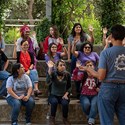Louis Stokes Biography
Personal Information
Born February 23, 1925; raised in Cleveland, OH; son of Charles and Louis (Stone) Stokes; married Jeanette Francis Jay, August 21, 1960; children: Shelley, Louis C., Angela, Lorene.
Education
Case Western Reserve University, 1946-48; Cleveland Marshall Law School, J.D., 1953.
Career
Worked for the U.S. Department of the Treasury in Cleveland, c. 1946-48; Stokes, Character, Terry and Perry (law firm), Cleveland, attorney, 1954-68; member of U.S. House of Representatives (Democrat), 1968--; cofounder, Congressional Black Caucus; chairman, Select Committee on Assassinations, 1977-79; member of Iran-Contra Investigating Committee and House Ethics Committee. Trustee, Martin Luther King, Jr. Center for Social Change. Military service: U.S. Army, 1943-46.
Life's Work
The thrust of Louis Stokes's career in the U.S. House of Representatives has been to serve and defend those who may not be able to do so for themselves. Stokes has spoken out time and again for the rights of the poor, especially those in urban America. He has sponsored legislation to help people of color enter the intelligence community, fought for adequate housing for the poor, and, as a member of the House Appropriations Committee, oversaw the passage of the Disadvantaged Minority Health Improvement Act of 1989.
One of Stokes's most eloquent statements of his mission came early in his career in the House. While the rest of the country was celebrating the first man on the moon, Stokes who challenged Congress to remember the forgotten. He said, as quoted by Christopher Maurine in his book Black Americans in Congress, "Today is a good day for us to reexamine our national priorities, to evaluate the posture of the President of the United States and the goals which he has set for people here on earth.... How, Mr. Speaker, for instance does this Nation justify sending a man to the moon while we are still studying hunger...?" Louis Stokes knows about poverty, having grown up in an impoverished part of Cleveland. As was the case with many poor young men of the day, Stokes's rise out of poverty was facilitated by the U.S. Army, in which he served from 1943-46. Following his discharge from the Army, Stokes worked for the Cleveland branch of the United States Department of the Treasury during the day and attended Case Western Reserve University at night on the GI Bill. Stokes received his law degree in 1953 and began practicing in Cleveland.
By the time of his run for Congress in 1968, Louis Stokes was the most prominent civil rights lawyer in Cleveland. He also served as the main political advisor to his brother, Carl Stokes, mayor of Cleveland and the first African-American mayor of a major U.S. city.
Early in his House career, Stokes battled a number of conservative movements, such as the Nixon Administration's attempts to weaken the Voting Rights Act of 1965, which enabled blacks to take full advantage of their voting rights. In refuting Attorney General John Mitchell's arguments on the floor of the House, Stokes asked members to consider what had happened in the Mississippi elections in 1969. After early assignments on the House Internal Security and Education and Labor Committees, Stokes eventually received some highly prestigious appointments. In 1977 Stokes was appointed chair of the Select Committee on Assassinations, the body that investigated the killings of President John F. Kennedy and the Reverend Martin Luther King, Jr. The first black to head a congressional investigating committee with such a high profile nationwide. In 1987 and 1988 Stokes chaired the House Intelligence Committee and was a member of the Iran-Contra Investigating Committee.
Stokes was named to head the House Ethics Committee in early 1991. Stokes was thought by the leadership to be capable of sound and sensible guidance. Stokes's record on House ethics votes is fairly lenient, something he freely acknowledges. "My whole career has been one of fighting for the underdog," he told Congressional Quarterly. "I'm sure that's reflected in my votes. But I think that even more than that, my record for being fair is what makes people respect me."
Awards
Distinguished service award, Cleveland NAACP; certificate of appreciation, U.S. Commission on Civil Rights; honorary degrees from Wilberforce University, Shaw University, Livingstone College, Morehouse College, and Meharry College of Medicine.






